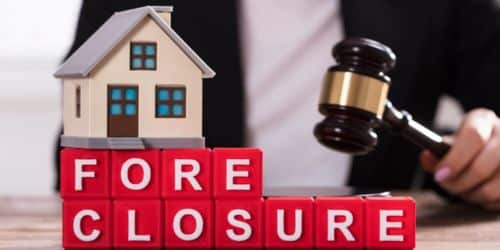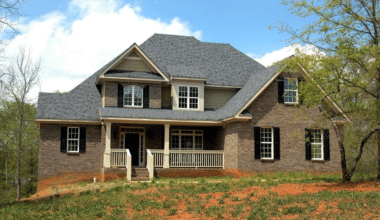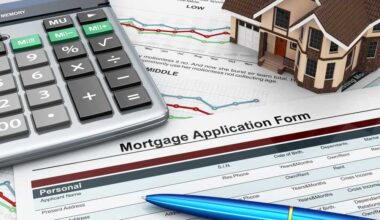Have you ever contemplated the idea of purchasing a property that has been foreclosed? It is crucial to have a clear understanding of your requirements and the appropriate approach to purchasing a foreclosed property. In this article, we will delve deeper into the concept of home foreclosure, and also explain how to buy a foreclosure home from a bank in Florida. So, let’s delve right in!
What Is a Foreclosure?
The real estate industry refers to a home that someone currently owns through a loan as a “foreclosed home.” Every mortgage deal comes with a lien on your property. A lien gives the lender the legal right to take ownership of the property if the user stops making their mortgage payments. People usually lose their homes to foreclosure when they can’t keep up with their mortgage payments. Buying a property that has been sold is different from buying a house from an individual homeowner.
In real estate, foreclosures happen when a borrower doesn’t pay their debt on time, which is called default, and the lender takes back the property. After taking back property, the loan will try to get back what they put into it by selling it for a little less than what it’s really worth. Rose Sklar, a real estate agent from the Sklar Team at Coldwell Banker in Weston, Florida, says that if the bank is keen to sell a property, it is possible to get it for less than its market value.
How to Buy a Foreclosure Home
Are you considering purchasing a foreclosed property? If you’re interested in purchasing a foreclosed home, there are several steps you can take to make the process smoother. Here’s a guide to help you navigate the process:
#1. Determine Your Options For Purchasing A Foreclosed Home
In certain states, it is required that foreclosed properties sold at auction be paid for in cash at the time of purchase. In contrast to some other states, only a nominal percentage of the sales price is required as a cash deposit. For individuals with limited funds, it may be necessary to concentrate on preforeclosure properties or those that have already undergone repossession.
#2. Determine Your Financial Assets
No matter what route you take to buy a home, it’s important to make sure you can afford the monthly payments. It’s smart to assess your financial situation and set aside a monthly sum that can be put toward your mortgage. Your mortgage payment shouldn’t be more than 28% of your take-home pay each month, as a rule of thumb. In addition to the principal and interest, there are other costs associated with a mortgage that must be taken into account.
Let’s examine the monetary effects of the assumption of a yearly income of $72,000, or a monthly income of $6,000. It is best to have a mortgage payment of no more than $1,680 per month. With the help of a mortgage calculator, you can quickly figure out how much you can spend on a home based on your current income.
#3. Obtain the Services of a Realtor Who Specializes in Foreclosures
Purchasing a property that has gone through foreclosure often requires extensive negotiation with lenders and sellers. Find yourself a reliable real estate agent. Find real estate agents who have dealt with foreclosures before in your region.
#4. Find Where to Buy Bank-Owned Properties
The internet is rife with tools to help you locate foreclosed properties. Zillow and Redfin allow users to specifically search for foreclosure and preforeclosure listings. The websites of several government organizations, including HUD, USDA, Fannie Mae, and Freddie Mac, also list foreclosures owned by the government.
#5. Apply for Mortgage Preapproval
You will need to provide your lender with some financial details to get preapproved for a mortgage. In exchange, they will provide you with a conditional loan offer for a specified sum of money. Once you’ve decided on a house, this might provide you with some assurance that you’ll likely get accepted for a mortgage. You can easily compare your options after receiving pre-approval from numerous lenders.
#6. Make a Deal
Making an offer is the next step once you and your real estate agent have decided on a property and price. You may have to place a bid at an auction, negotiate with the bank, or talk to the homeowner one on one, depending on where the foreclosure process stands. Make sure your offer is delivered to the proper person by consulting with your agent.
#7. Have It Inspected and Evaluated
After your offer is approved, you should have a professional home inspection performed before signing any paperwork. A house inspection is a technique in which a third party inspects a property for evidence of damage. If the inspection reveals severe issues that would be expensive to repair, you may be able to pull out of the sale.
Foreclosure homes, on the other hand, are often sold “as-is,” which means you may not even be able to conduct a comprehensive examination before purchasing. This might be harmful. If you go this route, be prepared to spend some money on home repairs. If you plan to finance the acquisition with a loan, your mortgage lender will require an assessment of the property.
#8. Buy Your Home
Again, the specifics of the foreclosure home you’re purchasing can alter the way this looks. You could be paying a cash deposit following an auction, or you could be there at the closing table signing documents like in a regular home transaction. The assistance of a real estate agent and a mortgage lender will be invaluable at this point.
Read also: PRE-FORECLOSURE: Can You Buy a Pre-foreclosure Home With a Loan?
How to Buy Foreclosure Home From Bank
The ways to buy a foreclosure home from the bank include the following:
#1. Obtain an Evaluation and Checkup
Foreclosure homes are not always the best deals. Because their primary goal is profit, financial institutions offer homes at reasonable rates. Some real estate-owned (REO) properties may sell at steep discounts due to damage or location, while others may not be lowered at all. A home’s genuine market value can be determined with the help of a professional evaluation.
Foreclosure homes, some of which may have been vacant for months or even years, are typically sold “as-is” and without any warranties. Thus, before you make an offer, have a house inspector take a look around.
#2. Lookup of Titles
It is safe to presume that a bank has cleared the title before listing a property. Before finalizing the sale, it’s important to check public records for any lingering liens or taxes and to employ a title company to conduct a thorough, insured title search.
#3. Manage Your Finances Wisely
Those who are serious about making a purchase should get pre-qualified for a loan. Better still, get pre-approved by the property’s lender. Realize that if your home sustains major damage, it could affect your ability to obtain financing. For example, if the home isn’t in move-in condition, getting a VA loan could be more challenging.
If the foreclosure home you’re looking at is in excellent shape, the fact that it’s a bank-owned property shouldn’t affect your loan application. Mortgage rates on foreclosure properties that are in reasonable condition should not be higher. Hence, before making any offers, be sure to do your research. Check the prices of recently sold properties in the area to ensure your offer is competitive. Don’t forget to include refurbishment expenses.
#4. Be Patient
Unlike putting an offer on a privately owned home, where the owner usually responds promptly, bidding on a real estate-owned (REO) property can take a while. After submitting a foreclosure home offer, it might take weeks to hear back because multiple parties typically review the offer. You should expect a counteroffer from the bank since they need to show their shareholders and investors that they did everything possible to acquire the highest possible price for the property. If the lender is not ready to budge on the purchase price, try to negotiate a lower interest rate or reduced closing charges instead. The bank may condition its acceptance of the agreement on receiving internal approval within five to ten days.
#5. Financing
The bank may lend you up to the full purchase price of the foreclosure, or even more if major repairs are needed, provided that your credit is excellent enough. The lender may require a 10 percent down payment if you plan to rent out the foreclosed property. The buyer may also require a private lender to purchase a foreclosure home.
You may want to see: HOUSE FORECLOSURE Explained!!! (+ Detailed guide to buying Foreclosed homes)
How to Buy a Foreclosure Home in Florida
The following are the steps to buy a foreclosure home in Florida.
#1. Identify Your Goals
You need to do the math and know your bottom line if you want to earn a profit at a Florida real estate auction. Know both your ideal price and the highest one at which you can sell an item and still make a profit. At an auction, it’s easy to get carried away and pay too much for a home. Until the house is sold and inspected, it might be difficult to determine how much repair will be required. As a result, before attending the auction, you must have a firm grasp of your financial constraints and the parameters within which your investment strategy falls.
#2. Don’t Let Yourself Get Swept Away
Auctions for Florida homes are often high-stakes affairs. You might be able to mentally calculate a given sum. However, it’s simple to become distracted by the competition in the heat of the moment and unintentionally overbid. If you buy a dud because you got carried away, you might never invest in real estate again. Maintain composure and continue forward with your strategy. Buying a home at auction demands discipline and a level mind, both of which are essential to financial success.
#3. Aim High but Be Ready to Bail if Necessary
Foreclosure purchases should be approached with caution. There is no way to know the property’s actual state until you can physically inspect it. If you go into the restoration thinking the house will need a complete overhaul or even demolition, you might be pleasantly surprised. However, things might turn ugly if you had intended to do a cosmetic restoration but found that the previous tenant had severely damaged the house.
Who Should Not Buy a Foreclosed Home?
Purchasing a foreclosed property may not be advisable if you lack substantial funds to allocate toward necessary repairs.
What Makes Buying a Foreclosed Property Risky?
Purchasing a foreclosed property entails acquiring it in its current condition, commonly referred to as “as-is.” As the responsible party, you are accountable for any necessary repairs that may arise. In certain instances, the former proprietors may have inflicted significant harm on the premises before their foreclosure.
How Does Foreclosure Work in Indiana?
The process of Indiana foreclosure typically consists of four fundamental components. There are four distinct stages in the foreclosure process: (1) the initial period of falling behind on payments, (2) the filing of a foreclosure lawsuit, (3) the foreclosure judgment, and (4) the sheriff’s sale. In the state of Indiana, the typical timeline for completion of this process is approximately 8-10 months.
Gathering Up
Foreclosed properties may have a tempting appearance at first glance. Unpredictable fees and hidden deterioration could make a home unattractive. The lengthy buying process may cause some prospective buyers to second-guess themselves, while the high demand for affordable foreclosed homes may deter others.
In light of the aforementioned, it’s clear that foreclosures have the potential to be fantastic bargains. Homebuyers get a once-in-a-lifetime chance to purchase properties at prices lower than the market rate. Saving money during the buying process increases the prospect of future investment and capital gains from the sale of the purchased asset. A buyer who responsibly purchases a foreclosed home stands to gain many advantages over many years.
References
- zillow.com
- investopedia.com
- bankrate.com
- creditkarma.com
Related Posts
- PRE-FORECLOSURE: Can You Buy a Pre-foreclosure Home With a Loan?
- HOUSE FORECLOSURE Explained!!! (+ Detailed guide to buying Foreclosed homes)
- PRE-FORECLOSURE LIST: Ways to Find Pre-foreclosure Listings – Guide
- TOP BAD CREDIT HOME LOANS: For First-Time Buyers & Veterans with Guaranteed Approval
- Financing Home Improvements: Options for Financing Home Improvements
- SALES TRAINING SOFTWARE: Top Best Options of 2023






